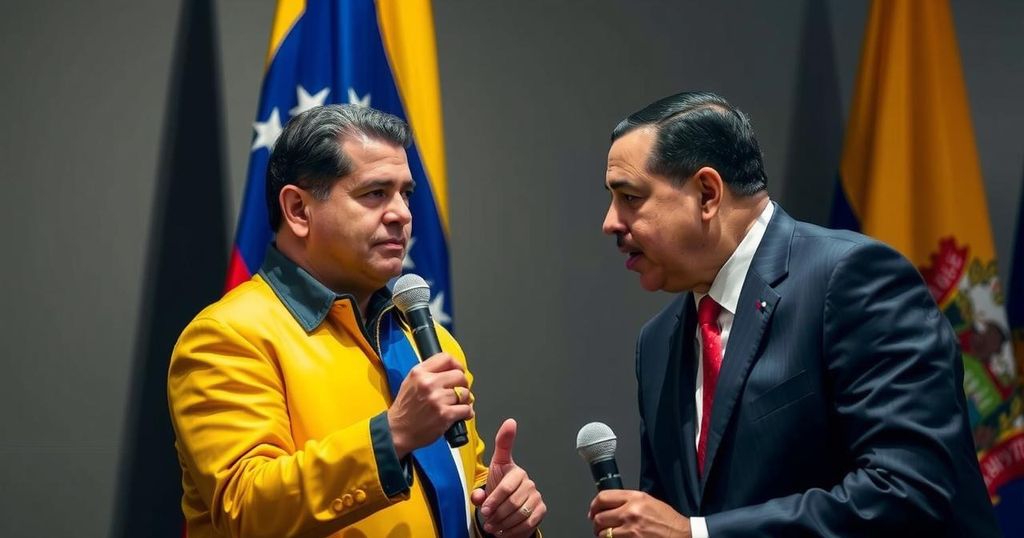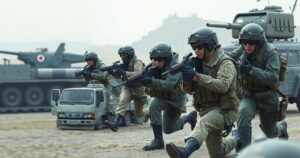Venezuelan Opposition Leader Urges Colombia’s President to Acknowledge Electoral Victory

Maria Corina Machado, Venezuelan opposition leader, has called on Colombian President Gustavo Petro to recognize her faction’s electoral victory from July 2023. Addressing Colombian senators, she highlighted the need for intervention amidst Venezuela’s crisis and stated that opposition candidate Edmundo González won decisively against Nicolás Maduro, despite official claims to the contrary. She warned that Maduro’s continued rule threatens peace in Colombia and urged for international support in this precarious situation.
In a recent address, Venezuelan opposition leader Maria Corina Machado urged Colombia’s President Gustavo Petro to officially recognize her faction’s electoral victory in Venezuela’s disputed July presidential election. Speaking virtually to the Colombian Senate, Machado emphasized that silence from the Colombian government amidst the ongoing crisis in Venezuela is no longer an option. She asserted that her faction’s transition to power is inevitable and expressed willingness for constructive negotiations, contingent upon respect for the sovereignty expressed by Venezuelans in the elections held on July 28. Machado, who has been in hiding to evade potential arrest, remarked on the lack of transparency from Venezuelan electoral authorities, who announced President Nicolás Maduro as the winner of the election but failed to provide detailed voting results, claiming their website had been hacked. In contrast, the opposition coalition, led by Machado, managed to secure and publish vote tally sheets from over 80% of the voting machines, which they assert demonstrate that opposition candidate Edmundo González won decisively against Maduro. Machado appealed to Colombian senators to act as guardians of this alleged victory and to amplify the voices of those suffering under the oppression of Maduro’s regime. She further highlighted that the continued leadership of Maduro poses a direct threat to peace in Colombia, warning that his presidency has fostered a haven for criminal groups that operate across the Colombian border. Despite efforts by leftist leaders in the region, including Presidents Petro, Lula da Silva of Brazil, and former Mexican President López Obrador, to mediate the electoral tensions, no substantial progress has been made, resulting in Maduro’s consolidation of power and the detention of numerous political opponents. Meanwhile, González has sought refuge in Spain following threats to his safety and freedom. Machado’s urgings to the Colombian leadership coincide with the upcoming January 10 commencement of Venezuela’s next presidential term, marking a critical period for both Venezuela and Colombia as they confront their intertwined political and social challenges.
The session in the Colombian Senate on which Machado spoke is underscored by the complex political backdrop in Venezuela. Following the controversial presidential elections in July 2023, the opposition, led by Machado, contested the results proclaimed by the Maduro-led administration. The lack of transparency and alleged manipulation of electoral data has led to widespread international scrutiny. As Venezuela faces a potential leadership transition, the role of neighboring countries, particularly Colombia, becomes pivotal in navigating this political landscape, especially given Colombia’s ongoing peace agreements with rebel groups that have strong connections to Venezuela. The emphasis placed by Machado on the implications of a Maduro presidency for Colombia’s stability highlights the regional significance of the Venezuelan political situation.
In conclusion, Maria Corina Machado’s appeal to Colombia’s President Gustavo Petro underscores the urgent need for international solidarity in acknowledging the Venezuelan opposition’s claim to electoral victory. As the situation in Venezuela intensifies, with its implications reverberating into Colombia’s peace processes with local guerrilla groups, the actions taken by neighboring governments could significantly influence the broader political landscape in South America. The upcoming period is critical for both nations as they navigate the ramifications of leadership transitions and regional security concerns.
Original Source: apnews.com





